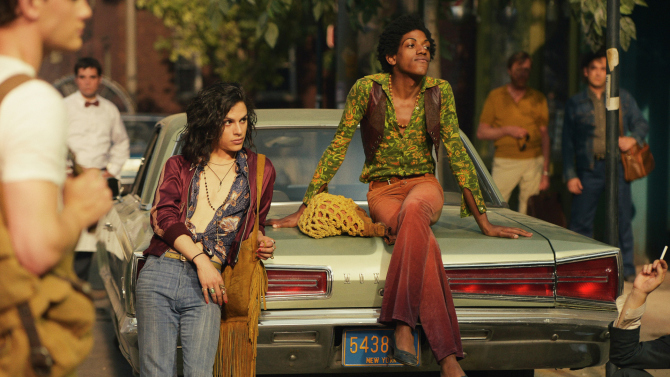OCTOBER 2, 2015
I hate to kick a man when he’s down, and director Roland Emmerich is really down.
Perhaps the most financially successful gay director ever, Emmerich has helmed such blockbusters as “Independence Day” and “The Day After Tomorrow,” and he has long wished to make a film chronicling the events leading up to the Stonewall Rebellion in 1969. He sought out Tony-nominated playwright Jon Robin Baitz to write the screenplay, and success appeared to be on the horizon.
In August, the film’s trailer finally surfaced, and then all hell broke loose.
In the preview, it appeared that the film depicted that the historic revolt was instigated not by lesbians, trans women, drag queens or people of color (as has been thoroughly documented) but instead by a fictional white jock from Indiana. Huh??? What??? Gay activists were outraged at what they saw was a rewriting of history, particularly at the expense of minorities. Defending Emmerich was legendary activist Larry Kramer (“The Normal Heart”) who said that it was unfair to judge a film by its trailer. (On this issue, I tend to side with Mr. Kramer.)
Then I saw “Stonewall.” Oh boy.
Before we start, I want to acknowledge that Emmerich is one of the nation’s most generous benefactors to gay causes, particularly the amazing Los Angeles LGBT Center. His donations have made a difference in the lives of untold numbers of gay kids and adults and will continue to do so in the future. So huge props to him.
That being said, “Stonewall” is a terrible film.
There’s a particularly despicable sub-genre of movies called “white savior” films where it takes a white person to come in and help a minority see the light and get back on its feet. (Kevin Kline in “Cry Freedom,” Tom Cruise in “The Last Samurai” and Sandra Bullock in “The Blind Side” come immediately to mind.) Directors argue that it’s a way to get white audiences invested in a story about minorities. Bullshit.
The white savior of “Stonewall” is Danny Winters (Jeremy Irvine of “War Horse”), a corn-fed high schooler from Indiana who is banished from his family after he is caught blowing the town’s star quarterback. He lands in the West Village and is taken under the wing of flamboyant Ray/Ramona (Jonny Beauchamp) who schools him on how gay life in New York works. The film then dawdles for the next 90 minutes until the money scene when the police raid the Stonewall bar on the pretext that serving alcohol to homosexuals is illegal, and the patrons decide to fight back, with Danny throwing the first brick at the bar’s window.
Look, if Emmerich wants to create a fictional gateway character to make it easier for an audience to get into the world of “Stonewall,” that’s his right. It doesn’t mean that it’s a smart decision, but it’s his decision. Please, though, at least make him interesting. Irvine’s Danny is so vanilla that we keep waiting for Ray/Ramona to come back onscreen so that we can at least have someone worthwhile to follow.
The blame for the utter collapse of “Stonewall” must also be shared by screenwriter Baitz as well. As I listened to the film’s flaccid conversations and cliched platitudes, I had to remind myself that this was the same man who wrote such brilliant plays as “The Substance of Fire” and “Other Desert Cities.” There’s a terrific political film somewhere inside “Stonewall,” but using this historical event just as background music to some midwest character’s coming out story is such a waste.
I begrudge no one’s passion project, particularly one with such high-minded intentions as this. I’m just saddened that the complete critical and box-office failure of Emmerich’s “Stonewall” will make it that much harder for a potentially great Stonewall movie to ever be made.
GRADE: D-












